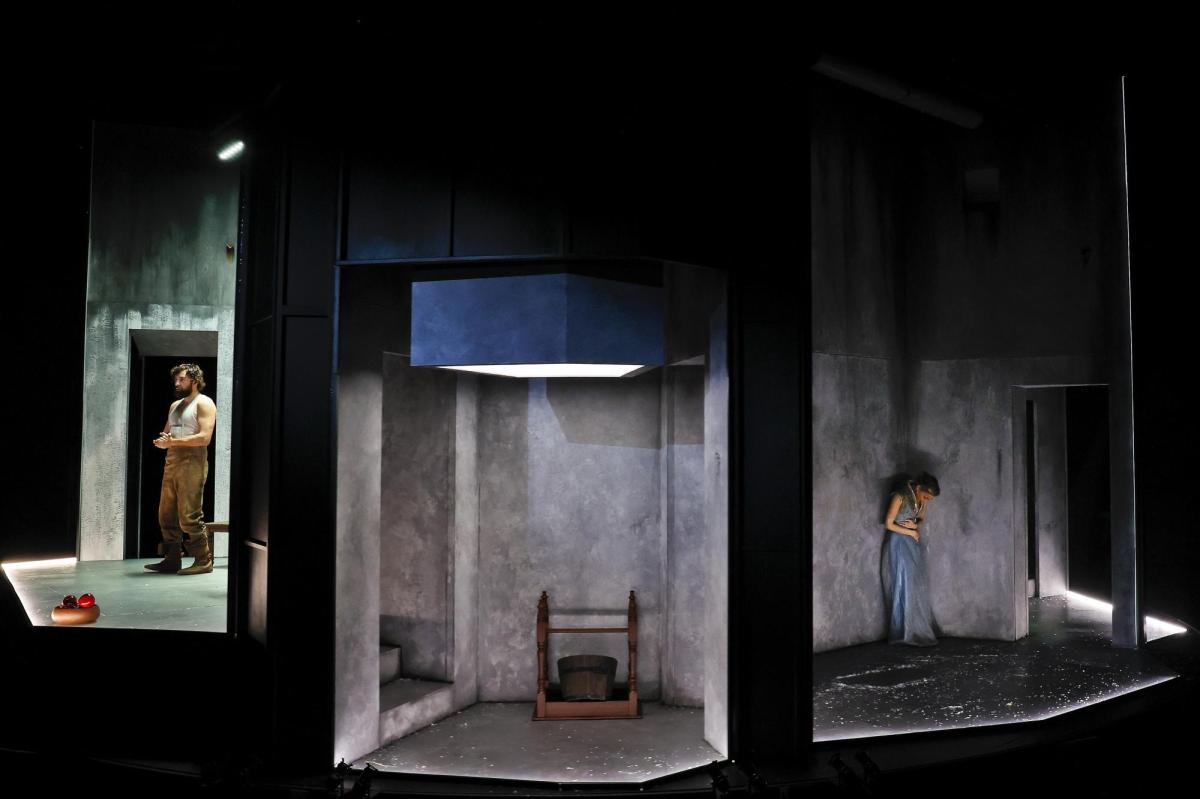We all know it, have seen it, studied it at school. The witches, blasted heath, eye of newt, toe of frog, hubris, madness and, ultimately, the fall of the usurper after some salient lessons in the anatomical ramifications of caesarean birth (not of woman born).
Macbeth is an eloquent, violent homage to ambition, as Shakespeare so beautifully puts it – ‘Life’s but a walking shadow, a poor player, that struts and frets his hour upon the stage, and then is heard no more. It is a tale told by an idiot, full of sound and fury, signifying nothing’.
Macbeth (An Undoing) written by British playwright, Zinnie Harris in 2023, directed by Matthew Lutton and previously staged in Edinburgh, London and New York, is touted as shifting the narrative to the perspective of Lady Macbeth (Bojana Novakovic). This process incorporates several elements such as swapping lines from husband to wife and vice versa.
As example, in the throes of psychological distress, after killing King Duncan (surely not a spoiler after 450 years), Macbeth (Johnny Carr) utters the fabulous and famous ‘out damn spot’ speech, while in the dying embers of their relationship and lives, Lady Macbeth gives us the juicy, lyrical goodness of the ‘tomorrow and tomorrow and tomorrow’ monologue. In this, the adaptation is not so much reimagining as it is tag-on.
There are also smatterings of contemporary language, including utterances of curse words, played for laughs rather than anything else. Compared to Shakespeare’s delicious iambic pentameter, these modern throw-aways occasionally seem clunky. At other times, such as the divine and underplayed interaction between Malcom (Tyallah Bullock) and Macduff (David Woods) on the edge of Birnam Wood, they perfectly counter-lever the richness of the original language.
The overall attempt in this adaptation is clear – to establish more character nuance for Lady Macbeth. But wait there’s more. We’re also given a hall pass (as if we needed one) to question the dominance of the patriarchy. Lady Macbeth is presented as strong because she can be. This, arguably, isn’t so much a feminist take as it is a highlighting of the “real”’ power of the “trad wife”. Forced into a position of anger and response, she doesn’t summon tenets of equality. She summons tenets of “I’m just as bad as a man, so I can do what I want”.
A great deal is also made of the five babies she has birthed, all of whom have died in infancy. This seems confusing. Is she more of a woman because she has given birth multiple times? Are we asked to contemplate postpartum depression at play in her decision-making? Just as perplexing is the approach to madness. While Macbeth’s descent into mental torture is psychological, Lady Macbeth’s is oddly metatextual.
She begins to baulk at the text itself, the scene work, speaking to offstage assistants, expanding a breaking of the fourth wall that begins in the first scene with Carlin/Witch (Natasha Herbert) telling us, the audience, that we’re in for a ride that isn’t what we expected, while simultaneously telling us it’s everything we expect.
It is this attempt at wanting everything that creates the play’s problems. There are several bets each way in terms of text, imagery, narrative and characterisation, and the result is, at times, lopsided. A case in point is Lady MacDuff, played with skilled energy and enthusiasm by Jessica Clarke. This character is expanded, given more motivation to be something, someone and, consequently, successfully elicit more sympathy when she dies.
The Witches (Herbert, Clarke and Bullock) act as Greek chorus-adjacent and in delightfully nuanced performances are more of an ominous, constant presence than in the source material, defying Lady Macbeth, rather than forming any kind of alliance that might be explored in a post-feminist version.
In contrast, Novakovic’s Lady Macbeth plateaus from one emotion to the next, never quite convincing us that she possesses the power of which she speaks or, indeed, the love of which she speaks. The same applies to Carr’s Macbeth – a performance bordering on passive rather than bold. The character needs to be dynamic, otherwise the fall is irrelevant. We need to believe in the relationship, otherwise the breakdown is unimportant.
This version of the story, however, is all about the efficacy of the ensemble. Stage veterans such as Jim Daly (Duncan), Tony Briggs (Ross) and Herbert (Witch) deliver fine and feisty stagecraft, while Banquo (Rashidi Edward) gives a joyously physical rendition of Macbeth’s erstwhile bestie. Khisraw Jones-Shukoor, as Lennox and soldier is suitably bloody and bereft. Woods’ MacDuff is equal parts taciturn and brutal. Bullock’s Malcolm/Witch is equal parts funny and inept.
By far the most striking character of this production is the set – an enormous revolve, an 11th century cold and inhospitable Scottish castle (complete with falling snow) that provides glimpses into rooms, secrets and nightmares, and allows the actors to literally remain on the move throughout. Set and costume designer, Dann Barber, achieves a startling piece of theatrical engineering – a visual feast, reminiscent of a Peter Greenaway film – snippets of life (and death) via moving parts. It’s astounding and occasionally overpowering.
A little more stillness would allow us to catch our breath. Special mention also goes to Jethro Woodward for the sound design – a thump, knock, birdsong, flutter of wings, all visceral additions to the work.
Read: Theatre Review: Brothers Wreck, Subiaco Arts Centre
Macbeth (An Undoing) is an enjoyable and thought-provoking theatrical adventure, astutely directed by Lutton. Although balls in the air are not always successfully caught, this is an intricate and stark examination of a classic tale.
Macbeth (An Undoing) by Zinnie Harris
After Shakespeare
Malthouse Theatre, Melbourne
Director: Matthew Lutton
Set and Costume Designer: Dann Barber
Lighting Designer: Amelia Lever-Davidson
Composer and Sound Designer: Jethro Woodward
Associate Lighting Designer: Tom Willis
Associate Sound Director: Justin Gardam
Intimacy Coordinator: Amy Cater
Fight Choreographer: Lyndall Grant
Stage Manager: Lisa Osborn
Assistant Stage Manager: Rosemary Osmond
Associate Fight Choreographer: Josh Bell
Cast: Bojana Novakovic, Johnny Carr, Tony Briggs, Tyallah Bullock, Jessica Clarke, Jim Daly, Rashidi Edward, Natasha Herbert, Khisraw Jones-Shukoor, David Woods
Macbeth (An Undoing) will be performed until 28 July 2024.





